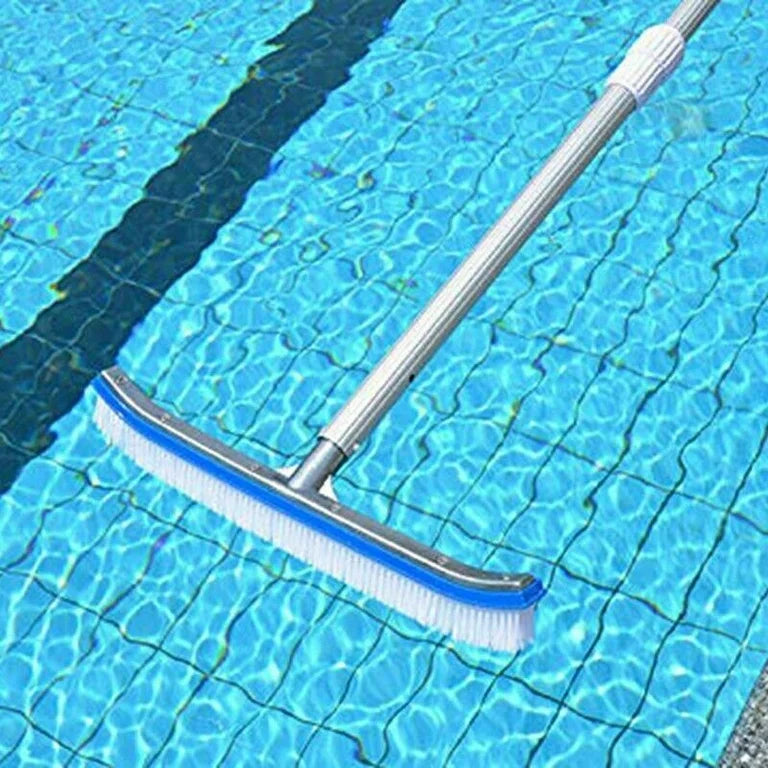Most pool owners do not fully understand the importance of brushing your pool walls and floor. A thorough brushing will prevent algae, extend the life of your pool's interior surface, and reduce your need for expensive chemicals. Pool brushing can be time-consuming, but it is not difficult.
Why Brush Your Pool?
When the microorganisms build up in your pool, they can leave the pool looking dirty, and the water looking muddy and create health hazards. Brushing the debris off the walls and floor of the pool causes the debris to move more toward the bottom suction line as well as the skimmers. This water will then move into the circulation system and be caught inside your filter media. Brushing your pool walls at least once a week or every other week is best. If you do not have an automatic or robotic pool cleaner then brushing your pool floor will also be best. Another great reason for brushing your pool is after adding chemicals, brushing can help disperse them into the water. It also helps prevent staining or scaling on the surface of your pool walls. Brushing regularly, along with maintaining a consistent chemical balance, can help keep the pool softer and smoother.
How To Brush Your Pool
Before you get started, the first step is to remove any debris. When brushing your pool, it is best to go in the direction of the main drain. Doing this will help any dirt and debris you loosen to be removed from the pool. When brushing, you should not be pulling, this will ensure all the algae and debris goes to the floor. Make sure your pump is running for the dirt and algae to be removed. If the pump is off the dirt and algae will remain in the pool water. You should first start from the stairs and any benches you may have. This is the most shallow part of your pool so it will be easier to get to. Next to scrub is the shallow end, after doing the shallow end walls brush the floor towards the drain. This will ensure everything will go towards the main drain. Now working on the deep end walls and the floor, still pushing all the debris toward the main drain. After everything is brushed and removed, you may want to clean your filter. This will help your filter not get clogged and work to the best of its ability.
Types of Pool Brushes
There are different types of pool brushes for different pool surfaces. Choosing the appropriate bristle material for a pool brush ensures thorough cleaning without damaging the pool’s surface.
Nylon Brush
A nylon brush is gentle and safe to use on all types of pool surfaces. It is most commonly used on vinyl and fiberglass pools. Because of the soft bristles, prevent tearing, scratching, or damage to your pool walls and floor. It will remove all the dirt and take off the algae spores.

Shown in the picture is the Pentair 24-inch curved nylon brush (R111342)
Stainless Steel
A stainless steel brush or wire brush is designed to aggressively clean algae and stains from pool surfaces. Because the bristles are so rough this can be only used on concrete or pebble tech surfaces.

Shown in the picture is the Pentair algae 6-inch stainless steel brush (R111616)
Grit Brush
A grit brush uses silicon carbide bristles and is often used for rougher pool surfaces. This type of brush does not rust and is longer lasting than most.

Shown in the picture is the 28” Animal Pebble Brush (BR4128G)
In conclusion, brushing your pool surface is important because it can prevent dirt and algae build-up. It can also help prevent stains and disperse chemicals if used right after adding chemicals. This will extend the life of your pool's interior and keep your pool water healthy.
If you have any questions or need help looking for a product for your pool please give us a call at 602-854-9058 or send us an email at support@epoolsupply.com. We have a fantastic team of pool professionals to help direct you to the right sources. Also, check out our YouTube videos where our pool professionals go over how to do installs, quick fixes, and more.

